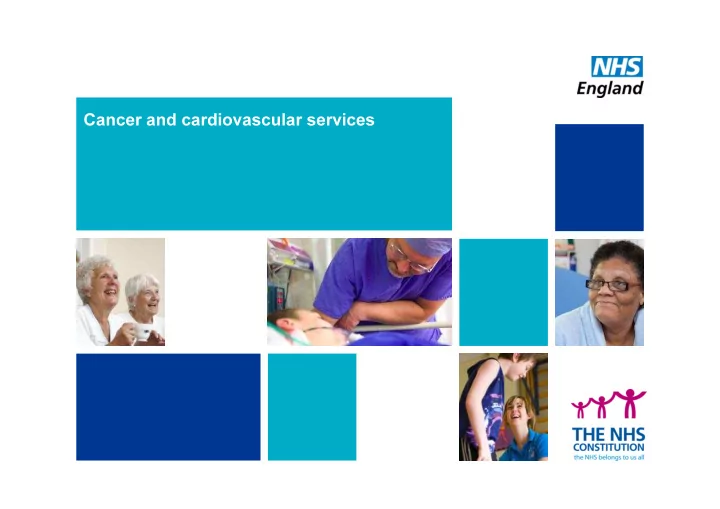

Cancer and cardiovascular services
About the programme • Local services are not organised in a way that gives patients the best care • Currently our specialists, technology and research are spread across too many hospitals • To address this, clinicians have recommended: – Specialist cardiovascular services at The London Chest, The Heart Hospital and St Bartholomew’s Hospital are consolidated to create an integrated cardiovascular centre at St Bartholomew’s – For specialist cancer care, the proposal is to consolidate only some of the specialist elements of five cancers • The majority of care would continue to be provided locally.
Specialist cancer services: scope Clinical scope Approx impact of the proposed changes Brain cancer surgery 97 of 831 procedures Head and neck cancer surgery 241 of 394 procedures Complex prostate cancer surgery 93 of 275 procedures (radical prostatectomies) Complex kidney cancer surgery 145 of 239 procedures (partial and full nephrectomies) Complex bladder cancer surgery 32 of 71 procedures Acute myeloid leukaemia (level 2b) treatment 18 of 118 patients Haematopoietic stem cell transplantation (level 53 of 274 procedures 3b) treatment OG (stomach or throat) cancer surgery 53 of 131 procedures
Programme update • The majority of CCGs have submitted formal support for the proposals • London Clinical Senate independent clinical assurance underway • Initial business case expected to be published in April 2014 Phase 1 Sep 13 – Apr 14 Phase 2 Apr 14 – Jun 14 Phase 3 2014 - 2018 Engagement Decision on Planning for Decision on recommendations implementation final Implementation Options appraisal (initial business and further business case) engagement case Clinical assurance
London Clinical Senate review: scope • Advise on robustness of clinical process to arrive at recommended options, and depth of clinical involvement and support • Advise on the future model and location(s) of radical prostatectomies, specifically: –A comparative analysis of current outcomes data –Which outcome measures should be used to compare radical prostatectomy performance –Implications of recently published NICE prostate guidance • Professor Chris Harrison, Clinical Senate Council Vice- Chair, leading the process
Expert reference groups Expert reference group Expert reference group (prostate) (programme-wide) • One clinician with expertise in • Consultant cancer services and one with Urologist/Andrologist, London expertise in cardiac services Clinical Senate Council Member • Two London Clinical Senate Lay • Director, Centre for Clinical Members Practice, NICE or nominee • A GP • Chair of the Specialised Urology Clinical Reference Group or • Director of Nursing and Medical nominee Director (both drawn from the London Clinical Senate Council • Clinical Audit Lead, British or Forum) Association of Urological Surgeons (BAUS) • A member of another Clinical Senate
Clinical Senate assurance review: plan April 2014 Senate Desk-based Panel Conclusions Mobilise reports to review interviews and report NHSE Programme-wide clinical review Prostate review 7
Initial business case approval • A Commissioner Programme Board will have final approval of the initial business case • The board will comprise NHS England and six CCGs who are majority commissioners for the proposed changes: – For specialist cardiovascular 59% of activity is CCG commissioned. Of this, 70% is commissioned by Haringey, City and Hackney, Enfield, Islington, Camden and Barnet CCGs – For specialised cancer care all the services are commissioned by NHS England, except acute myeloid leukaemia. This would particularly impact Enfield, Barnet, Haringey and Camden CCGs due to the proposed transfer of services to ULCH from other locations
Planning for implementation ROLE MECHANISMS • Ensuring plans meet the standards and requirements NHS England: identified in engagement (eg management of co- • Specialised dependencies, meeting volumes, deliverable in a Commissioning safe and timely manner) • Ops and Delivery Commissioners • Ensuring system-wide benefits are identified and the overall change programme will deliver these benefits CCGs • Ensuring a framework is in place to assure the ongoing implementation Common • Deciding whether to proceed to implementation Commissioner Board • Pathway Boards • Signing-off clinical service models from a pathway • UCL Partners Clinicians perspective • Provider Clinical • Developing proposals for a individual pathways Directors • Developing robust implementation plans and service models • Provider Providers • Providing confidence to clinicians and commissioners programmes that the plans and models are deliverable • Mobilising their own delivery programmes TDA / TDA Board • Approving Barts Health OBC and FBC DH/HMT process DH/HMT
Planning for implementation: major trauma 1/2 • Full day clinically-led workshop in January - over 45 representatives from across the system including national clinical director for trauma care. • Recognition of the excellence of the current trauma service, and the significant improvements that it has made with a clear commitment to maintain services and work collaboratively between trusts • Importance of culture and interpersonal relationships to deliver excellent trauma services
Planning for implementation: major trauma 2/2 • Trauma services require many different specialties, skills and support services, which must continue to be available through effective collaborative working • Programme of work underway between trusts, UCLPartners and commissioners to mitigate risks • This element of work will form part of the wider planning for implementation phase of the programme
Phase two engagement approach • Approach discussed with patient advisory groups and meeting scheduled to discuss approach with local Healthwatch groups • Engagement period commence following approval of initial business case • Plain English summary leaflet of proposals distributed to all stakeholders • Information available online and cascaded via trusts, CCGs and stakeholders • Engagement events: – 1x prostate discussion event in outer north east London – 3x stakeholder advisory group meetings covering travel, whole pathway integration, and service impacts – Open offer to attend meetings
Next steps • Following endorsement of the recommendations in the initial business case, phase two of the programme will commence including: – Phase two engagement – Planning for implementation – Development of commissioner assurance and oversight frameworks – Development of decision-making business case • The above will support final decision-making expected in June 2014
Recommend
More recommend